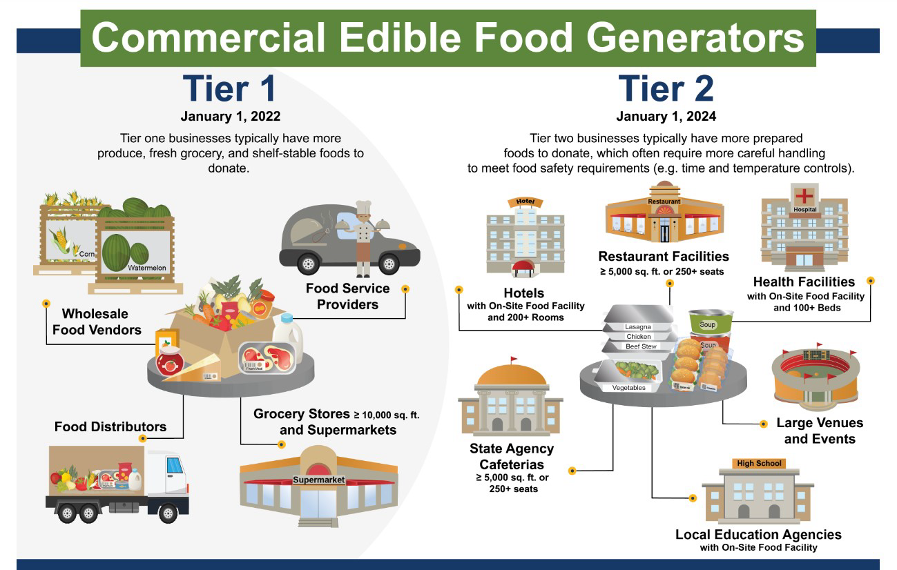SB1383-Compost and Recycling Law
On January 1, 2022, California State law (Senate Bill 1383) went into effect requiring that compostable materials be kept out of landfills. In Pleasanton, the law is implemented under the Organics Reduction and Recycling Ordinance, through a partnership between the City of Pleasanton, Pleasanton Garbage Service, StopWaste and the Alameda County Environmental Health Department. It replaces and expands on the Mandatory Composting and Recycling Ordinance that has been in place in Alameda County Since 2012.
What is the new law?
In September 2016, Governor Edmund Brown Jr. set methane emissions reduction targets for California (SB 1383 Lara, Chapter 395, Statutes of 2016) requires residents and businesses to keep food and other compostable materials out of landfills to help fight climate change.
- SB 1383 (Lara, Chapter 395, Statutes of 2016) is the most significant waste reduction mandate to be adopted in California in the last 30 years.
- SB 1383 requires the state to reduce organic waste [food waste, green waste, paper products, etc.] disposal by 75% by 2025.In other words, the state must reduce organic waste disposal by more than 20 million tons annually by 2025.
- The law also requires that 20% of currently disposed edible food be recovered for human consumption by 2025.
This has significant policy and legal implications for the state and local governments.
Landfills are the third largest source of methane in California. Organic waste in landfills emits 20% of the state’s methane, a climate super pollutant 84 times more potent than carbon dioxide and air pollutants like PM 2.5, which contributes to health conditions like asthma.
When compostable materials like food scraps, paper, cardboard and plant trimmings break down in landfills, they produce methane, a potent greenhouse gas and contributor to climate change. When we dispose of these items in the green cart (food and plant waste) instead of placing them in the garbage, those materials are made into compost – a valuable resource used to grow our food and we reduce methane emissions.
Pleasanton City Council Actions related to SB1383
- July 2021, the City adopted the SB1383 Action Plan
- October 2021, the City adopted the SB1383 ORRO
Edible Food Recovery
California Senate Bill 1383 (SB 1383) sets requirements to divert organic waste from landfills and to increase edible food recovery by 20% by the year 2025. The law requires cities to establish edible food recovery outreach and inspection programs, help connect mandated edible food generators with food recovery organizations/services and ensure there is sufficient county-wide capacity for all the recovered edible food.
Per SB 1383, mandated commercial Edible Food Generators. Businesses (known as “generators”) producing, selling and/or serving food must arrange to recover and donate the maximum amount of edible food that otherwise would be thrown away. Generators are categorized under two tiers. Tier 1 and Tier 2 Edible Food Generators and must:
- Arrange to recover the maximum amount of excess edible food that would otherwise go to landfills.
- Either establish a written agreement with partnering organizations/services that accept edible food.
- Maintain records of all edible food recovery activities and receipts and have them available upon request by the City.
List of food recovery organizations and services in Alameda County

Franchise Agreement with Pleasanton Garbage Services
SB 1383 requires the City to implement garbage Collection programs, meat Processing Facility requirements, conduct contamination monitoring, provide education, maintain records, submit reports, monitor compliance, conduct enforcement and fulfill other requirements; and, the City has chosen to delegate these waste collection responsibilities to Pleasanton Garbage Services through a Franchise agreement with Pleasanton Garbage Services.
The resolution and full agreement can be found here:
Resolution and Franchise Agreement with Pleasanton Garbage Services.
